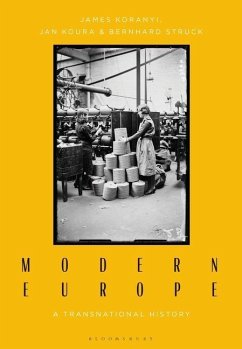Europe is a small continent, and yet it became the dominant global power from the late 18th century. While the continent appeared to become a global centre, it also experienced various fractures along constantly shifting state borders. These developments over the past 250 years have made European history especially dynamic and exciting. Modern Europe: A Transnational History explores the complexity of this continent by telling a history of transnational Europe, showing how it has been constantly reinvented and reconfigured by global and local connections and ruptures. The authors explain Europe not in terms of a collection of national histories, but focuses on the numerous cross-border flows of peoples, goods and ideas that cut across state boundaries. As this book shows, the peoples and societies of Europe can only be understood by painting a picture of connections and contestations created within empire, the national, and the local.
Hinweis: Dieser Artikel kann nur an eine deutsche Lieferadresse ausgeliefert werden.
Hinweis: Dieser Artikel kann nur an eine deutsche Lieferadresse ausgeliefert werden.








